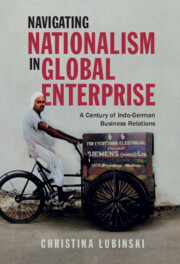Book contents
- Navigating Nationalism in Global Enterprise
- Cambridge Studies in the Emergence of Global Enterprise
- Navigating Nationalism in Global Enterprise
- Copyright page
- Dedication
- Contents
- Figures
- Tables
- Acknowledgments
- Introduction
- Part I Nationalism and Competitive Dynamics
- Part II Emergent Strategy in a World of Nations
- 5 Refining Political Capabilities
- 6 Planning for Uncertain Futures
- 7 Stability in a Wobbly World
- 8 Reimagining the World in Stages
- Conclusion: Rehistoricizing Nations
- Appendices
- Bibliography
- Index
8 - Reimagining the World in Stages
from Part II - Emergent Strategy in a World of Nations
Published online by Cambridge University Press: 27 October 2022
- Navigating Nationalism in Global Enterprise
- Cambridge Studies in the Emergence of Global Enterprise
- Navigating Nationalism in Global Enterprise
- Copyright page
- Dedication
- Contents
- Figures
- Tables
- Acknowledgments
- Introduction
- Part I Nationalism and Competitive Dynamics
- Part II Emergent Strategy in a World of Nations
- 5 Refining Political Capabilities
- 6 Planning for Uncertain Futures
- 7 Stability in a Wobbly World
- 8 Reimagining the World in Stages
- Conclusion: Rehistoricizing Nations
- Appendices
- Bibliography
- Index
Summary
Chapter 8 follows the Indo-German collaborations to the 1980s. Indias primary development goal was rapid industrialization and it invested heavily in imports from abroad, including from Germany, which turned into one of its most important trading partners. However, India also struggled with a chronic foreign exchange crisis, requiring development aid from abroad. The underlying mental map of nationalism changed during this period, stressing a policy direction focused on a predetermined path to growth and development. Grappling with the relationship between nations was less a matter of interpreting ideas derived from politics and ideologies and more an exercise of mastering development science. In this framework, nation states with a unique history and identity increasingly turned into building blocks of a worldview that prioritized countries development stage over its unique national features. While top-level strategy of German multinationals reflected these abstract and universal models of the world, strategy on the ground in India was shaped not by predictable categories but by one-off and specific negotiations with Indian officials, especially since the mid-1970s in the context of changes to the Foreign Exchange Regulation Act and anti-monopoly legislation.
Keywords
- Type
- Chapter
- Information
- Navigating Nationalism in Global EnterpriseA Century of Indo-German Business Relations, pp. 211 - 245Publisher: Cambridge University PressPrint publication year: 2022



